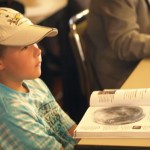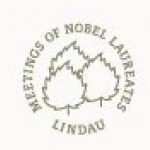
When it comes to geologic phenomena, the difference between renewal and cataclysm can walk a fine line. On All of My Faults Are Stress Related, Kim Hannula elucidates the distinction between causes and triggers. Citing an article about the Zipingpu Dam that concludes that the weight of the reservoir might have triggered an earthquake, Hannula notes that "the ultimate cause of the earthquake was the collision of India with Asia, and the resultant tectonic mess." Elsewhere, Erik Klemetti on Eruptions dresses down Popular Science alarmism, concluding that the chance of exploratory drilling…
Shakespeare wrote that "past is prologue," but it's not always that easy to read. Brian Switek on Laelaps tells the tale of P. H. Gosse, a man who tried to reconcile the fossil record with the Book of Genesis, at the same time Darwin was writing his Origin of Species. Convincing no one, Gosse estranged even the faithful with his image of God as "a trickster who planted gags to fool geologists." But given the ample evidence that dinosaurs were once alive, the debate continues: were they warm-blooded? On Not Exactly Rocket Science, Ed Yong shows us a new study which says yes, based on the "hip…
Sometimes, present circumstances can belie the uncertainty of the future. On Not Exactly Rocket Science, Ed Yong discusses experiments on "restraint bias" which show that many people overestimate their powers of self-control. He notes that "we're generally bad at predicting the future," arguing that those who feel the strongest are the most likely to risk temptation and defeat. On Respectful Insolence, Orac critiques the latest "kerfuffle over screening for cancer," which questions the value of routine screening. While early detection may seem like a no-brainer for an improved prognosis…
Humans believe a lot of things, for a lot of reasons. Confronted by a student who had learned lions' manes are an expression of their testosterone level--and not just a bit of claw-catching fluff--Greg Laden observes that when someone finds you wrong on one count, they will assume you are wrong about everything. He calls this "a known feature of student thinking in early development," a true-or-false mentality which sooner or later must reconcile itself with the complexity of our universe. Elsewhere, Razib Khan theorizes on Gene Expression that organized religion arose to meet the needs of…
After hours of deliberation late into Saturday night, the US House of Representatives passed the long-awaited health care reform bill. While many Americans are elated at the new bill's passing, others are questioning the controversial amendment added that prohibits insurance coverage for abortions. Ed Brayton from Dispatches from the Culture Wars examines the compromise many Democratic Representatives made with Catholic bishops local to their constituencies in adding this amendment. Later on, Ed also criticizes what he calls "unruly behavior" exhibited by some House Republicans to delay the…
As the Earth's tectonic plates shift and grind miles below our feet, we feel the effects on the surface in the form of earthquakes and volcanic activity. As Ed Yong of Not Exactly Rocket Science and Chris Rowan of Highly Allochthonous explain, earthquakes far from tectonic plate boundaries may be aftershocks of more violent seismic events along mid-continental faults that occurred hundreds of years earlier. According to a study published in Nature this week, faults in the middle of a continent take much longer—100 years or more—to return to normal activity; thus, aftershocks can occur long…
When the controversial and talented physicist Edward Teller was doing a PhD. with the great Werner Heisenberg at the University of Leipzig, the question asked at the end of every group meeting that focused on a complex sequence of problems was "Wo ist der Witz?", supposed to be translated as "What is the point"? but more correctly translated as "What is the joke?". The joke part of it consisted of turning a wry eye at the world, donning the hat of the court jester who laughs even as the fire that he predicted would engulf the world rages on. The question about global warming that we ask is…
That was it, we're back. After six inspiring days in Lindau, the Nobel Laureates Meeting 2009 has ended. Eight authors blogged about it on ScienceBlogs Germany, plus we had further blogging guests such as PZ Myers, Bora Zivkovic and Seema Singh.
I did not make myself heard in the last two days. That was due to a lack of wifi on the Isle of Mainau where we spent the last days. Nevertheless it is time now to sum up what our English bloggers had to offer you:
Sir Harold Kroto gave a video interview in which he talked about competition in science and the negative aspects of a Nobel Prize.
We…
Phew. The fourth day in Lindau is about to end and I think I speak for everybody when I say extreme humidity is not exactly our favourite aggregate state concerning the weather in this town. Nevertheless we've had another great day at the Nobel Laureates Meeting and would like to share thus with you, fellow readers:
Two laureates have been portrayed by our bloggers today: The young chemist Oliver Schuster met Aaron Ciechanover and listened to his very philosophical remarks on modern medicine. Then our very active guest blogger from the US, Ashutosh Jogalekar, portayed Sir Harry Kroto and…
In our timezone we've nearly reached the end of day three of the Nobel Laureates Meeting 2009. As before, the conference has been dominated by two conjuctures: The atmosphere of pure wit that about 600 scientists spread and scorching temperatures.
Nevertheless it is time to sum up what has been concerning us on ScienceBlogs Germany: First of all our two fellow bloggers from your site arrived - Bora and PZ Myers reached Lake Constance after a supposedly looong trip on planes and trains. Now our team of bloggers is complete.
The day started with a panel on climate change - six Nobel Laureates…
The congress center "Inselhalle" at the opening
Also a very young person is attending.
The harbour after my first interview.
The young participants keep discussing outside.
A view back on my way to the hotel.
» Paula Schramm is a chemist and doing her PhD at the University of Stuttgart.
Ask an informed layman what he or she thinks is the greatest science-based industrial discovery or invention of all time and the person will likely name the computer, the transistor, the telephone, the incandescent light or perhaps even the blast furnace. But key as all these inventions were to humanity's progress, there is perhaps one industrial discovery that surpasses them in the sheer earth-shattering and fundamental change it brought about not only in the struggles of human survival but in the bedrock of our very existence on this planet. That discovery is the discovery of the means to…
The what???
Well, you see, one of the traditional events at the Lindau Nobel Laureates Meeting is the annual cockchafer speech. Let me explain that.
The first conference in 1951 ended with a gathering of all attending Nobel laureates and their host, Count Lennart Bernadotte, to take a group photograph. Unfortunately it turned out that the laureates felt quite uncomfortable in front of the camera - and a group photograph of annoyed men would not have given the right impression of the successful first meeting.
So, when Count Bernadotte saw a cockchafer lying on the ground, he picked it up and…
When the chemist Wilhelm Ostwald received the Nobel prize for his research on catalysis in 1909 he probably didn't expect that his field of work would still be one of the most important topics in modern chemistry one hundred years later. Nevertheless all three Nobel Prizes in chemistry in the last years were given to scientists that worked in catalysis research.
One of them, Gerhard Ertl will be giving a talk on the catalysis happening when solids are coated with gossamer surfaces. The scientist got the Nobel prize in 2007 and named his speech "From atoms to complexity - reactions on surfaces…
Annually focusing on a different discipline, the Nobel Laureates meet in Lindau (Southern Germany). This year's meeting is going to be about chemistry and we, the editors of ScienceBlogs.de will be covering all events along with seven blogging scientists.
Although there will of course be lots of articles in German, we also launched an English section of the blog in which the most interesting articles will be translated - may the readers of this site forgive occasional bumpiness in our language skills.
As mentioned earlier here, PZ Myers will also attend the conference. The main topic of this…
Johnson and Horgan are back on this week's Science Saturday diavlog on Bloggingheads.tv:
From BHTV:
In this week's episode of Science Saturday, John Horgan and George Johnson explain how the latest Jarmusch film, "The Limits of Control," conveys a message of significance for struggling science journalists everywhere. They also discuss how neural implants might improve your sex life, whether it's time to declare defeat in the war on cancer, and whether human civilization is going to be crushed by food shortages.
The billionaire media icon Oprah Winfrey sealed a contractual deal with notorious anti-vaccination supporter Jenny McCarthy Monday that will enable McCarthy to spread her belief that vaccines cause autism across several platforms. This viewpoint is vehemently opposed in the scientific community, as it remains virtually unsupported after years of rigorous scientific investigation and, if heeded as true, has lethal consequences in the form of diseases like measles, mumps and rubella. With support from Oprah, McCarthy is slated to host a syndicated talk show and maintain a blog. According to…
The Scientist revealed Thursday that pharmaceutical company Merck, Sharp & Dohme paid Elsevier—the world's largest publisher of medical and scientific literature—to produce a publication that gave the appearance of being a medical journal, but was actually a marketing promotion for Merck. The 2003 publication, The The Australasian Journal of Bone and Joint Medicine, was written by the staff of Merck to favor Merck pharmaceuticals and lacked the unbiased peer review that is crucial to the credibility of medical journals, presenting evidence for the efficacy of a Merck drug when…
Correction appended: This post incorrectly stated the Center for Disease Control as the organization responsible for raising the pandemic threat level. This is the duty of the World Health Organization.
Swine flu outbreaks are raising alarm across the globe and prompting the World Health Organizationto consider raising the pandemic threat level. For the most current interpretations of what's happening from experts on the ScienceBlogs network, see the following category threads: "Pandemic-Preparedness" and "Swine Flu" from Revere at Effect Measure, and "Influenza" and "Outbreak" from Tara…
Related ScienceBlogs Posts:
Jake on genetics and obesity
Razib on obesity and heritability




